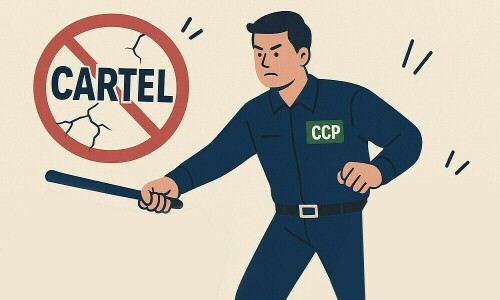CCP Imposes Rs1.007 Billion in Penalties for Anti-Competitive Practices
During fiscal year 2024-25, the Competition Commission of Pakistan (CCP) enforced twelve significant directives, levying penalties totaling Rs1.007 billion on various enterprises. These businesses were found to be engaging in practices that stifled competition within vital sectors such as fertilizers, poultry, automotive, pharmaceuticals, real estate, food, hygiene products, paints, and education, as stated by the CCP.
According to the official statement, the commission has reinforced its enforcement capabilities and expedited hearing processes to minimize unnecessary delays. This accelerated strategy enables the CCP to more efficiently resolve cases and uphold the law.
Of the twelve directives issued, eight addressed instances of misleading marketing.
Specifically, three orders were related to cartel conduct and price manipulation. Another directive was issued following a Lahore High Court order, focusing on the CCP’s jurisdictional role in a case concerning the deceptive and unauthorized use of a trademark, as defined under Section 10(2) of the Competition Act.
Notices Issued to Sugar Mills for Cartel Rehearing
The CCP also imposed a collective fine of Rs375 million on six urea producers and their representative body, the Fertilizer Manufacturers of Pakistan Advisory Council (FMPAC), for engaging in price-fixing. Each company received a penalty of Rs50 million, while the association was fined Rs75 million.
Additionally, a substantial penalty of Rs155 million was levied on eight poultry hatcheries for coordinating the prices of day-old broiler chicks.
In cases of deceptive marketing, Kingdom Valley faced a fine of Rs150 million for making unsubstantiated claims regarding their housing development. Unilever and Friesland Campina Engro were each fined Rs75 million for deceptively marketing frozen desserts as ice cream products. Unilever was further penalized with an additional Rs60 million for misleading advertisements related to Lifebuoy products.
Al-Ghazi Tractors was penalized Rs40 million for making inaccurate claims about fuel efficiency. Hyundai Nishat Motors was fined Rs25 million for deceptive advertising related to the Hyundai Tucson SUV.
Deceptive Marketing Practices: CAT Supports CCP Findings Against PREMA Milk Marketers
3N Lifemed Pharmaceuticals received a Rs20 million fine for employing falsified certification for dialysis equipment. However, this penalty was later reduced to Rs2 million by the Competition Appellate Tribunal (CAT). British Lyceum and Diamond Paints each incurred a Rs5 million fine for disseminating misleading advertisements.
CCP Chairman Dr. Kabir Sidhu cautioned, “Cartelization represents a grave violation and will not be condoned. Such practices undermine economic advancement, infringe upon consumer rights, and discourage fresh investments.”
He further stressed that association platforms must not facilitate “price collusion or any form of market abuse,” which ultimately disadvantages the entire nation.



Comments (0)
No comments yet. Be the first to comment!
Leave a Comment